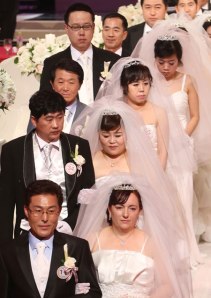
Starting next year, foreign spouses will be required to take a Korean Language test when applying for a marriage visa. As of now, there is no rule requiring foreign spouses to take the Korean Language test, but because there have been many reports of interracial marriages ending up in divorce and several cases of domestic violence and marital problems caused by language barrier and cultural differences, theMinistry of Justice is implementing stringent language requirements.
According to the Koreatimes, the test will be given during a visa interview. If you have acquired the beginner level certificate of the Test of Proficiency in Korean (TOPIK), the interview will be waived. To pass Level 1 of TOPIK, you should be able to understand and construct simple sentences for practical writing and daily life (such as introducing yourself, greeting, shopping and ordering at a restaurant) using 800 basic vocabulary words and simple sentence structures in Korean. To obtain Level 2, you should be able to comprehend and express common and personal topics (such as schedules, hobbies and appointments) using 1,500 to 2,000 words and more basic grammar structures, as well as distinguish between formal and informal use of the Korean language. If you want to know more about TOPIK, you may visit topikguide.com.
If the foreigner is not proficient enough to be able to communicate with the spouse in Korean, the visa application will be reevaluated after six months. If the foreigner fails to pass the Korean language test for a second time, the foreigner should attend government-sponsored courses for social cohesion after arriving in Korea to get a visa.
Besides the new language requirement, a Korean spouse should have a given income level in order to qualify for marriage to a foreigner. The minimum per-month level is 1.1 million KRW (around 975 USD/42,000 PHP).
The ministry has also set new regulations for marriage brokers, deemed to be the main cause of unsuccessful interracial marriages.
Will these new regulations alleviate domestic violence, marital problems and accelerating divorce rates in interracial marriages? While we do appreciate the effort the ministry is putting into solving current predicaments many interracial couples are facing, we can’t hep but wonder, are these new set of rules for the good of both the foreigner and the Korean spouse? The Korean government is trying so hard to educate foreign wives and husbands on Korean language and culture, but are there any programs that help Korean spouses understand their foreign partner’s culture? Marriage is a two-way street. It is not only us, foreigners, who need to understand our Korean spouse’s culture and learn his/her language to be able to communicate with him/her. Our Korean spouse should also learn to “communicate” with us and embrace a part of who we are or where we come from. We, foreigners, are asked to learn almost everything Korean. We ask that our Korean spouse learn just enough to respect us and accept us more than a mere wife or husband who has to obey strict Korean norms all the time.
As for the Korean spouse’s salary requirement, 1.1 million KRW? Really? That is not even the average salary for a Korean high school graduate. How about a thorough background check on the Korean spouse instead? Perhaps a behavioral and/or mental check-up, too? (Am I being too harsh? Sorry.) I have met two foreigners who met their Korean husbands through matchmaking. One of them ran away upon realizing that her husband has a mental disorder. I don’t know her personally, but I was asked to contact her, find out her whereabouts and convince her to return to her husband. She refused, of course, but I don’t have any news about her now or if she was granted divorce, which she requested from her Korean husband’s family after she went back to the Philippines. The other foreign wife, a Vietnamese, is still married to her Korean husband who is mentally challenged. Her marriage, her life in Korea is difficult. She has to work in the factory to fend for herself and her husband. She is, by the way, fluent in Korean, but does that help her at all?
As long as matchmaking is legal in South Korea, domestic violence and broken marriages among multicultural couples will remain rampant. Implementing stricter rules for foreign spouses will do very little to solve the problems. Can’t the Ministry of Justice or the Korean government be fair and give stricter requirements for Korean spouses, too? What is so special about matchmaking that they can’t abolish it once and for all?
Related article
- Why I Married a Korean (chrissantosra.wordpress.com)
- Why I’m Learning Korean Again (chrissantosra.wordpress.com)
- Just How Important is Your ARC? (chrissantosra.wordpress.com)
- Let Me Tell You Something about My Korean Parents-in-law (chrissantosra.wordpress.com)
- Interesting New Marriage Law… (kenzieinkorea.wordpress.com)
- Download 30th TOPIK Problems and Answer Keys (koreanvitamin.wordpress.com)
- Why I’m learning Korean language? (nikanorovalbert.wordpress.com)
- What It’s Like Being A Foreigner Living In South Korea (businessinsider.com)
- Extramarital Affairs (klawguru.com)
- South Korea’s Multiculturalism (mappingwords.com)

